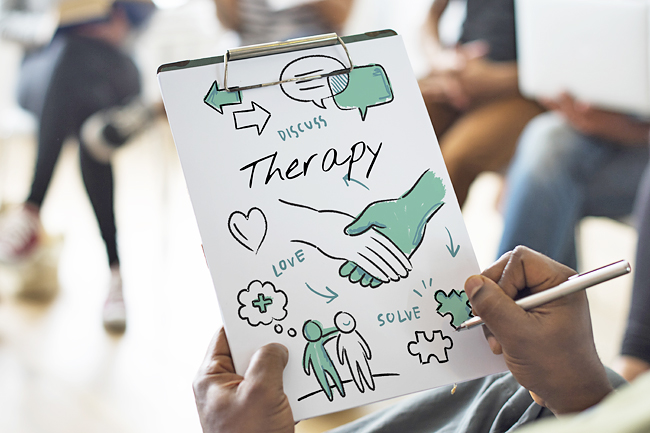Lesley Alderman
THE WASHINGTON POST – Anxiety takes many forms, you probably have your own tormenting version but it’s typically a feeling of extreme fear or worry, often paired with catastrophising thoughts and physical symptoms.
When it is problematic, anxiety can become debilitating to your mental and physical health, contributing to a number of serious conditions, including burnout, cardiac disorders, gastrointestinal problems, hypertension, migraine headaches and dementia.
Environment plays a part, but so does your legacy. Anxiety runs in families: 30 to as much as 50 per cent or so of your anxiety is because of your genes. Forty-one per cent of people with anxiety disorders are not treated, which is tragic, since there are scientifically proven strategies to help you feel better.
“Everyone feels anxious at times,” said Elizabeth Hoge, director of the Anxiety Disorders Research Programme at Georgetown University School of Medicine in the United States (US).
“It’s the intensity and frequency of symptoms that makes it problematic.”
It’s hard to tame anxiety when you suppress it, hate it or, worse, stoke it.
Approach anxiety like you would any other surmountable problem. To quell your anxious mind, make friends with it. Put your arm around that part of you that gets anxious and become curious.
Consider these tactics for addressing your anxiety. And be sure to prioritise sleep, everything is harder when you’re exhausted.



NAME IT
When you start to feel anxious, pause and try to identify your feelings as precisely as possible. Perhaps it’s something like: I feel a sense of dread about going to work today.
Labelling feelings helps your prefrontal cortex organise chaotic emotions into rational thoughts, dampening their effect, according to research by Matthew Lieberman, a neuroscientist and professor at the University of California in the US.
Next, confide in someone you trust so you feel less alone. Explain that you don’t need help, you just want to share your emotions.
INVESTIGATE
Explore what’s behind the feeling. Maybe your work anxiety is fuelled by fear of being laid off or judged harshly by a boss. Tune into your triggers.
Also, practice what’s known as cognitive reappraisal, which means reframing the meaning of an emotion to alter its impact.
For instance, being laid off is scary, but it could also be an opportunity to find a better position where you feel more secure.
Reappraising is associated with decreased anxiety, while suppressing emotions is associated with increased symptoms.
TAKE DEEP BREATHS
“Relaxation is important,” said psychologist and author of The Anxiety Phobia Workbook Edmund Bourne. “It’s the first thing I teach my patients.”
Taking a few deep belly breaths, inhaling through your nose and exhaling through your mouth, can turn down your body’s stress response, which is particularly helpful if your anxiety is accompanied by physical symptoms such as shallow breathing, a racing heart or churning stomach.
Make it a habit to take breathing breaks throughout the day. An app such as Breathwrk and the Breathing App can help guide you.
LISTEN TO MUSIC
Several studies have found that music can reduce levels of anxiety in critically ill patients.
Experiment with different types of music to see what helps you feel calmer.
TAKE A BRISK WALK
“A single bout of exercise can improve your mood,” said Kristin Szuhany, a clinical psychologist at New York University Grossman School of Medicine in the US.
Walking outside while focussing on your surroundings can help you feel more connected to your present experience and away from the worried thoughts in your head.
TAKE A MINDFULNESS CLASS
A recent study by Hoge found that people who attended an eight-week, in-person course in mindfulness-based stress reduction (MBSR) experienced a decrease in anxiety similar to those who were prescribed escitalopram, an anti-anxiety medication. The participants in both groups started out with moderate anxiety; after eight weeks, their anxiety had dropped to levels considered mild.
Anxiety levels continued to drop even after the study was over. MBSR, which was developed in 1979 by Jon Kabat-Zinn, teaches skills such as mindfulness meditation, yoga and breathing awareness.
SEE A CBT THERAPIST
Cognitive Behavioural therapy (CBT) teaches you to challenge your irrational thoughts and behaviours.
It’s a short-term therapy, about eight to 16 sessions that’s been proved to help with anxiety and help you learn to manage anxiety spirals.
You’ll be given homework assignments to do between sessions and after therapy has ended. “Patients tend to see a lot of progress in a short amount of time,” said Szuhany, who uses CBT with her patients.
MONITOR YOUR DIET
Research about the relationship between diet and mood is in its infancy but making your diet healthier can’t hurt.
A journal review found higher levels of anxiety in people whose diets included high intake of sugar, refined carbohydrates and high-fat foods, and low levels of tryptophan and protein.
One recent study revealed that the artificial sweetener aspartame produced anxiety-like behaviour in mice.
CHALLENGE YOUR HABIT
Anxiety can become an addiction. “You can become so used to worrying that it becomes who you are,” said author of Unwinding Anxiety Judson Brewer. “It fills the space and gives your mind something to do.”
Brewer, an associate professor at Brown University, said it’s vital to become mindful of your worrying habits.
Let’s say you feel anxious every time you give a presentation. Your mind gets in the habit of worrying in the days leading up to the event.
Worrying stokes your anxiety. And then anticipating the next presentation becomes more fraught and a negative loop becomes established.
Instead, you could sit with the original fear and get used to the feeling, rather than fretting about it.
To try tracking your anxious habits, download Brewer’s free habit mapper.
CONSIDER MEDICATION
There are many medications that have been proved effective at reducing anxiety. Talk to your healthcare provider about your specific symptoms to determine which medication might work best.
Selective serotonin reuptake inhibitors (SSRIs), such as escitalopram – brand name Lexapro – and serotonin and norepinephrine reuptake inhibitors (SNRIs) are commonly prescribed for anxiety as well as depressive disorders.
They take a week or more to work fully, and then lead to a lessening of symptoms.
Benzodiazepines such as lorazepam are prescribed to treat short-term symptoms and take effect within hours.
Beta-blockers are also fast-acting and can help if you struggle with uncomfortable symptoms such as rapid heart rate, sweating and tremors, according to the National Institute of Mental Health.
The more you understand your anxiety, what triggers it, what helps to tame it, the better you’ll be able to manage it and the healthier you’ll feel.



















































